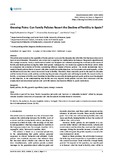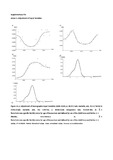Mostrar el registro sencillo del ítem
Growing pains: can family policies revert the decline of fertility in Spain?
| dc.creator | Elizalde San Miguel, Begoña | es_ES |
| dc.creator | Díaz Gandasegui, Vicente | es_ES |
| dc.creator | Sanz, María T. | es_ES |
| dc.date.accessioned | 2023-02-15T14:18:37Z | |
| dc.date.available | 2023-02-15T14:18:37Z | |
| dc.date.issued | 2023 | |
| dc.identifier.citation | Elizalde-San Miguel, B., Díaz-Gandasegui, V., Sanz García, M. T. (2023) Growing pains: can family policies revert the decline of fertility in Spain?. Social Inclusion, 11(1), 1-13. https://doi.org/10.17645/si.v11i1.6141. | en |
| dc.identifier.issn | 2183-2803 | |
| dc.identifier.uri | https://hdl.handle.net/2454/44718 | |
| dc.description.abstract | This article aims to analyze the capability of family policies to reverse the sharp decline in fertility that has been observed in Spain in recent decades. The analysis was carried out by applying two mathematical techniques: the genetic algorithm and the strategic scenarios. Firstly, a mathematical model was designed and validated adjusting the combined performance of fertility and family policies during the 2008–2019 period. Subsequently, this model was applied to the future (2020–2060) to extrapolate the evolution of fertility considering different models of family policies. The results demonstrate that a model of family policies that is coherent with other socially desirable objectives, such as gender and social equality, will be insufficient to reverse the current downward trend in fertility. Therefore, these outcomes point to the need to articulate and harmonize diverse public policies considering the principles of equality and well‐being to modify the recent decline in fertility. An increase in fertility must therefore be identified as a socially desirable goal and public policies must be adapted to this objective, in the understanding that fertility not only requires family policies but also their coherence with the employment and educational policies and work–life balance mechanisms offered by public institutions. | en |
| dc.description.sponsorship | This study was conducted under the competitive research project Problemas no Lineales en Ciencias Naturales y Ciencias Sociales (Nonlinear Problems in Natural Sciences and Social Sciences; PID2020- 112517GB-I00), funded by the Spanish Ministry of Sciences and Innovation. It was also supported by the Department of Social Analysis of the Carlos III University of Madrid. | en |
| dc.format.mimetype | application/pdf | en |
| dc.language.iso | eng | en |
| dc.publisher | Cogitatio | en |
| dc.relation.ispartof | Social Inclusion, 2023, Volume 11, Issue 1, Pages 1-13 | en |
| dc.rights | © Begoña Elizalde¿San Miguel, Vicente Díaz Gandasegui, María T. Sanz. This is an open access article distributed under the terms of the Creative Commons Attribution 4.0 license. | en |
| dc.rights.uri | http://creativecommons.org/licenses/by/4.0/ | |
| dc.subject | Family policies | en |
| dc.subject | Fertility | en |
| dc.subject | Genetic algorithms | en |
| dc.subject | Spain | en |
| dc.subject | Strategic scenarios | en |
| dc.title | Growing pains: can family policies revert the decline of fertility in Spain? | en |
| dc.type | Artículo / Artikulua | es |
| dc.type | info:eu-repo/semantics/article | en |
| dc.date.updated | 2023-02-15T13:13:35Z | |
| dc.contributor.department | Sociología y Trabajo Social | es_ES |
| dc.contributor.department | Soziologia eta Gizarte Lana | eu |
| dc.rights.accessRights | Acceso abierto / Sarbide irekia | es |
| dc.rights.accessRights | info:eu-repo/semantics/openAccess | en |
| dc.identifier.doi | 10.17645/si.v11i1.6141 | |
| dc.relation.projectID | info:eu-repo/grantAgreement/MICINN//PID2020– 112517GB‐I00 | en |
| dc.relation.publisherversion | https://doi.org/10.17645/si.v11i1.6141 | |
| dc.type.version | Versión publicada / Argitaratu den bertsioa | es |
| dc.type.version | info:eu-repo/semantics/publishedVersion | en |




